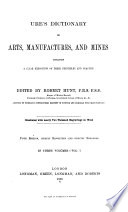 | David Ames Wells - 1856 - 598 pages
...formed matter in a solid mass of hard, impenetrable particles ; and that these primitive particles, being solids, are incomparably harder than any porous...— no ordinary power being able to divide what God: made one in the first creation." Q. Practically, do we KNOW of any limit to the division of matter... | |
 | James David Forbes - 1856 - 218 pages
...incomparably harder than any bodies compounded of them; even eo very hard as never to wear or break to pieces ; no ordinary power being able to divide what God himself made one in the first creation." Horsley's Newton, vol. iv., 260, quoted by Daubeny. 1 A profound and subtle thinker of our own time... | |
 | JOHN FARAM - 1857 - 162 pages
...Sir I. Newton conceived "' that it was formed in solid, massy, hard, and impenetrable particles, so hard as never to wear or break in pieces, no ordinary power being able to divide what God made one in the first creation." In this view bodies are composed of particles, from which they differ... | |
 | William Whewell - 1858 - 356 pages
...to space, as most conduced to the end for which He formed them ; and that the primitive particles, being solids, are incomparably harder than any porous...pieces; no ordinary power being able to divide what God had made one in the first creation. While the particles continue entire, they may compose bodies of... | |
 | David Ames Wells - 1859 - 528 pages
...particles Wag solids, are incomparably harder than any porous bodies compounded of them; so *Ky bard as never to wear or break in pieces, no ordinary power being able to divide riut God made one in the first creation." research had elevated chemistry to the rank of an exact science,... | |
 | David Ames Wells - 1859 - 524 pages
...formed matter in a solid mass of hard, impenetrable particles ; and that these primitive particles being solids, are incomparably harder than any porous bodies compounded of them ; so very hard as never to wear or break in pieces, no ordinary power being able to divide what God... | |
 | Francis William Upham - 1860 - 462 pages
...by weight and measure, was proved. Newton's idea of the primitive particles of matter, " as solids incomparably harder than any porous bodies compounded of them, even so very hard as never to wear out, or break in pieces, no ordinary power being able to divide what God himself made one in the beginning,"... | |
 | William Somerville Orr - 1860 - 94 pages
...them ; and that the primitive particles, being solids, are incomparably harder than any porous bodice compounded of them ; even so very hard, as never to wear or break in pieces, • Man. Mem. Second Serles, vol. 1. 296. To this Essay Dr. Dalton baa annexed " A Table of the JlelatiTe... | |
 | Andrew Ure - 1860 - 972 pages
...to space, as most conduced to the end for which He formed them ; and that these primitive particles, being solids, are incomparably harder than any porous bodies compounded of them ; even so hard as never to wear or break to pieces ; no ordinary power being able to divide what God Himself... | |
 | David Ames Wells - 1860 - 528 pages
...formed matter in a solid mass of hard, impenetrable particles ; and that these primitive particles being solids, are incomparably harder than any porous bodies compounded of them ; so verу hard as never to wear or break in pieces, no ordinary power being able to divide That God... | |
| |